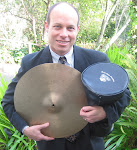I wrote this skit to illustrate how the evolution of art--its form, audience and production have changed. Form, audience, and production have changed along with society in the last 221 years.
Feel free to use the skit in a World History or Music History classroom or elsewhere. Please let me know if you use it. If my fellow teachers like it I will write more.
Feel free to use the skit in a World History or Music History classroom or elsewhere. Please let me know if you use it. If my fellow teachers like it I will write more.
_______________________________________________________________________
Haydn
Rap
Franz Joseph Haydn Travels to New York City
Setting: a recording studio in New York City, 2011
Haydn: Where am I? Just a second ago I was in Prussia working on a new composition. It is a nice summer day in 1780, is it not? No, I must be in purgatory. I am hearing loud, hideous, repetitive noises, and chanting about acts of violence. These sounds must be manufactured to punish people.
Rapper: Our time machine works! Welcome to America and year 2011, Mr. Haydn. I’m Hoho, a world famous composer of hip-hop music. We wanted to get a classicist’s opinion about our craft. These pop music sounds you consider abuse will probably sell a million units.
Haydn: I am amazed that you can somehow preserve recordings and even more astounded that you sell music. I have worked my entire professional life as a patron to Prince Esterhazy and his family. The noble court supports, finances, and enjoys the art I have created. Art is not a commodity like so many loaves of bread that is sold to the ignorant and unwashed masses.
Rapper: Why should you be satisfied with a life of dependency, creating according to the whims of your master? You have an audience of one. I have an audience of millions, and no one is my master. Not only am I richer than you. I am freer to create whatever I want. I have the lifestyle of the true artist.
Haydn: You are not free. You are a slave to the whims of the public. In my day the English created textile factories. Like you, the owners of those factories created products that were bought by millions. The factories created rhythmic noise too. Like the factory owners, you do not create based on artistic freedom, but on the changing styles of the masses.
Rapper: I sell recordings, not shirts. My music is performed and played all over the world. I’m a pop star!
Haydn: People today react strongly to your primitive sounds but are unsophisticated and have never been exposed to inspiring music. Your cacophonous electronic instruments and inflammatory lyrics have not produced great art. I agree that what you have created is popular, but it is neither morally nor spiritually uplifting. The events in the Roman Coliseum were also popular with the masses. “Popular” should not be equated with “good.” Your so-called music may allow you to accumulate great wealth and satisfy your selfish desires, but it inspires the masses to act like beasts.
Define the following words and explain how Haydn used them:
1. purgatory
2. commodity
3. cacophonous
4. inflammatory
__________________________________________________________
Answer the following questions:
1. Who had access to music in Haydn’s time and who has access to music now?
2. Do you believe that music must be composed for an elite group? If not, how else will music be maintained at a high quality?
3. What is the most important purpose of music? Give evidence.
4. The Internet is taking over many of the traditional marketing tasks of another old elite that once controlled the propagation of the arts, the record company. Name these marketing tasks and note two positive and two negative facts resulting from this democratization of music production.






This is my favorite skit that you have written! I have mixed feelings about it. While I completely agree that rap instrumentals are repetitive and lyrics often disgusting, sometimes the words are very clever or politically influential.
ReplyDeleteI agree with people who believe that great classical music can relax the mind and help listeners think (or even increase intelligence), while rap music does the opposite. But I listen to both. Rap often motivates me while I run (and slow-tempo classical fails at this). Rap also can be very humorous (in a way that "Love of the Three Oranges'" humor just can't).
I like the name Hoho and completely agree that most of rap music could be classified as "abuse."
A few things that you didn't mention:
1) An even greater travesty is when great classical songs are used in rap music. Sometimes rap artists will take a bar or two from a song and repeat it over and over. This can be both obnoxious and disrespectful (in my view).
2) Hoho definitely would talk in a more gangsta tone.
3) I don't think Hoho would know any language besides Ebonics.
4) I think that many rappers are proud of their "music" as an "art form" just as much as the amount of money they make.
In all, great skit!
-Sam
Hi Sam:
ReplyDeleteThanks for your comment! I'm glad you enjoyed the skit. I agree with all of what you say except for the Ebonics part. Some rappers use proper English (at least in day-to-day life) as well as the street variety. Also, Haydn's "view" does not necessarily reflect my own. All the best!